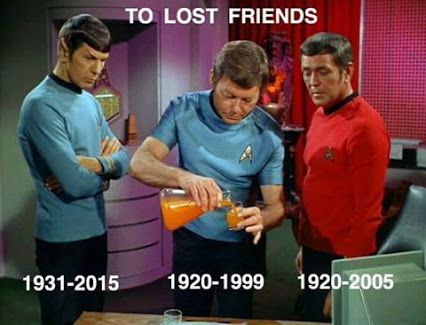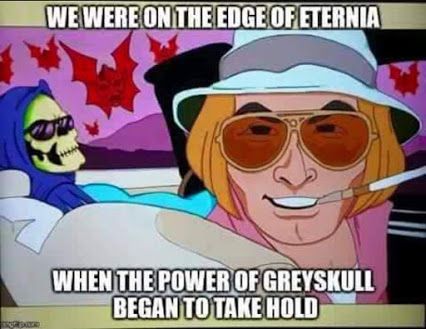SENSOR SWEEP: Neutered by Star Wars, Soulless Elves, Peculiar Shifts, and Dozens of Indistinguisable Books
Wednesday , 8, June 2016 Sensor Sweep Leave a comment Books (Glorious Trash) After the Good War — “One of the joys of any trash fiction fanatic is scouring the mass market paperback racks at the local second-hand books emporium. I’ve made countless discoveries of heretofore-forgotten novels this way, and this book, first published in hardcover in 1972 and released by Popular Library with a groovy psych cover in ’74, might just take the cake. It’s a sterling example of the also-forgotten sci-fi genre which was all the rage at the time: the turned-on psychedelic science fiction that catered to the freaked-out masses of the post-Woodstock generation. That brief time when sci-fi was dangerous, when it reeked of sex, drugs, and rock, before the genre was neutered by Star Wars.”
Books (Glorious Trash) After the Good War — “One of the joys of any trash fiction fanatic is scouring the mass market paperback racks at the local second-hand books emporium. I’ve made countless discoveries of heretofore-forgotten novels this way, and this book, first published in hardcover in 1972 and released by Popular Library with a groovy psych cover in ’74, might just take the cake. It’s a sterling example of the also-forgotten sci-fi genre which was all the rage at the time: the turned-on psychedelic science fiction that catered to the freaked-out masses of the post-Woodstock generation. That brief time when sci-fi was dangerous, when it reeked of sex, drugs, and rock, before the genre was neutered by Star Wars.”
Appendix N (Dark Herald) Appendix N Heroes; Imric the Elf Earl — “Tolkein’s elves were intrinsically good if unearthly. They were the Golden People. Not so much closer to God but closer to Man before his fall at Eden. They toiled not and lived lives of Unearthly beauty. Anderson’s elves on the other hand are not nice at all. They not creations of God. They have no souls and hence are fundamentally incapable of love or morality. They are the anti-Tolkein. However, they are very much in keeping with the old stories of faerie. This soullessness is a central theme of this book. All of the faerie are soulless. Both the elves and their enemies the trolls. And all of faerie blanches before the encroaching power of the White Christ whose church will drive them to oblivion.”
Appendix N (Gamers & Grognards) On What Referees/GMs and Players Owe To Each Other and Their Games — “I will tell you that first and foremost a read through of Appendix N literature will greatly improve your game. It will get you more involved in the reasons that your character’s abilities function as they do. It will help you with the ‘in game’ meta-reasons that everything works the way it does. Remember, if you are playing D&D or it’s simulacra, you are playing a game that was designed to emulate that list of fiction! Knowing the fiction can only aid you.”
Pulp Revolution (Planetary Defense Command) Cirsova #1 — “This is the kind of writing that keeps me reading sci-fi/fantasy — it first pulls you into the story and holds your attention, then sparks your imagination and gives you ideas for stories of your own. Misha might be out of the novel-writing business, but now that I’ve read this novelette, I really hope he’ll write more short fiction.”
 Game Design (Lewis Pulsipher) My Game Design Philosophy — “I like the game to represent something, to be a model. In many Euro-style games, the atmosphere (often wrongly called theme in this case) is ‘tacked on’ (and could be changed considerably), and the players are entirely concerned with pure mechanics and with the other players. I like to be able to understand that when I move something in the game, or do something in the game, it’s something like an event that could happen in reality. And when something happens in a game, it could have happened in reality. Having been educated in history, I am far more skeptical than most about relating real-world events to game events.”
Game Design (Lewis Pulsipher) My Game Design Philosophy — “I like the game to represent something, to be a model. In many Euro-style games, the atmosphere (often wrongly called theme in this case) is ‘tacked on’ (and could be changed considerably), and the players are entirely concerned with pure mechanics and with the other players. I like to be able to understand that when I move something in the game, or do something in the game, it’s something like an event that could happen in reality. And when something happens in a game, it could have happened in reality. Having been educated in history, I am far more skeptical than most about relating real-world events to game events.”
Appendix N (Russel Newquist) Every Party Needs a Priest — “The show borrows the mythological trappings of Christianity: crosses, holy water, exorcisms, and, in later seasons, even angels. But the problem is that none of these items working the way they do in the show makes any sense without the theological aspects of Christianity to back them up.”
Game Design (EuroGamer.net) Alexis Kennedy on: How it happened to happen — “Genres look as eternal and fundamental as gravity, but somewhere, right now, an indie developer is about to do something tiny and casual that will alter the whole of gaming for the next 50 years. Possibly it’s you.”
Gaming (Dice Addict) Any Sufficiently Advanced Magic — “The powerful wizard and sorceress and their magic were forced to the edges of civilization, hard against the borders beyond which the elder chaos held sway. Those that survived became the wise-women and cunning-men of more recent tales, while their places at the center of society were usurped by the priestess and the holy man with their miracles.”
Appendix N (PC Bushi) The Secret Legend of Appendix N — “Upon infiltrating the society of which I speak, one encounters references to a mysterious text known as Appendix N. At first I glossed over these mentionings. I’ve played a few tabletop games, but my interest in the older incarnations of D&D is thin, though respectful, and mostly academic. As you linger, however, these rumblings will continue, and will be invoked not only in the context of gaming, but of literature and great works.”
 Lovecraft (Flynn Gray) H P Lovecraft and the Foundations of a Mythos — “Another common feature was a focus on ancient books and writings, feared and loathsome volumes, sometimes in obscure languages. Particularly in the case of the Cthulhu Mythos, the Necronomicon is the most feared of all. The antagonists in Lovecraft’s writing often have an obsession with occult books, either having large libraries of their own, or going to great lengths to acquire particular volumes (sometimes both).”
Lovecraft (Flynn Gray) H P Lovecraft and the Foundations of a Mythos — “Another common feature was a focus on ancient books and writings, feared and loathsome volumes, sometimes in obscure languages. Particularly in the case of the Cthulhu Mythos, the Necronomicon is the most feared of all. The antagonists in Lovecraft’s writing often have an obsession with occult books, either having large libraries of their own, or going to great lengths to acquire particular volumes (sometimes both).”
Appendix N (Tor.com) Travel Back into Science Fiction’s Past with Stories from the Radium Age! — “Perhaps most interesting is to see the way the stories interrogate ideas like consciousness, mutation, and evolution, while accepting the era’s racist and imperialist assumptions as simple facts of life. While this obviously makes for uncomfortable reading, it’s also a way to watch human society change and grow with time through the stories it tells itself. As Glenn points out, there is also a peculiar shift into occult storytelling at this time, as many sci-fi writers back away from the purer science of Wells, Shelley, and Verne and into stories of ESP, spiritualism, and even the eldritch gods of Lovecraft.”
Pulp Revolution (The Frisky Pagan) Cirsova #1 review — “Nowadays, when thinking about the fantasy and fiction genre, the first that comes to mind are huge, Bible-like novels inspired by Tolkien or those never-ending trilogies. If you are a more voracious reader of contemporary fantasy, you will surely end up with dozens of indistinguishable books with some hodded male or female model (a Mary/Charlie Sue of some sort) posing with a sword on the cover.”
Appendix N (John C. Wright) Exiled to the Twenty First Century — “In the movie version of A PRINCESS OF MARS, for some unaccountable reason called JOHN CARTER, a Virginia gentleman and survivor of the Civil War, who, on Mars, is stronger than any other man on the planet, steps in front of the space princess menaced by the ferocious green Martians, who are tusked and titanic monsters excelling in their savagery. She snorts at him in contempt, and, in a moment of slapstick comedy, yanks out a snickersnee and begins cutting open green Martians like a barkeep peeling lemons for cocktails. At one go, the story makes the Martian savages no sort of threat, since even half-clad young girls are perfectly safe among them, makes the woman no one who any real woman can be like and no real man would want to be near, and makes the superhumanly strong male lead a comedy relief character whom no man would want to be like and no woman would want. Since there is no danger to the woman, and no point to the hero, and no menace from the savages, there is no tension, no drama, and no plot, and the moral of the story young men take away is that men are wimps and woman are rude and that offering to save someone else from rape, slavery and death is rude and useless and makes you look like a fool.”
Cutting Edge Education! (Independent Women’s Forum) University Puts Dean on Leave Over ‘Too Western’ Curriculum — “Seattle University has apparently caved to the demands of student activists, putting a besieged dean on administrative leave after protestors claimed the liberal-arts curriculum focused too much on classical Western history and philosophy.”
 Appendix N (HiLo Brow) Radium Age Sci Fi: 100 Best — “I fervently hope that science fiction enthusiasts will be able to hold their noses when encountering some of the sexist, racist, imperialist language and context which characterizes all literature of that particular era. I’m a fan of this era’s stories not just because it’s fun to see where some of the genre’s tropes—berserk robots, telepaths, mutants, eco-catastrophes, lost worlds—come from. But also because the 100 stories that I’ve identified are well-written, entertaining, and unsettling in the best possible sense.”
Appendix N (HiLo Brow) Radium Age Sci Fi: 100 Best — “I fervently hope that science fiction enthusiasts will be able to hold their noses when encountering some of the sexist, racist, imperialist language and context which characterizes all literature of that particular era. I’m a fan of this era’s stories not just because it’s fun to see where some of the genre’s tropes—berserk robots, telepaths, mutants, eco-catastrophes, lost worlds—come from. But also because the 100 stories that I’ve identified are well-written, entertaining, and unsettling in the best possible sense.”
The Other Canon (Real Clear Politics) An Impending Coup at St. John’s College — “All students take essentially the same course of study, known fondly as ‘the Program.’ There’s Homer, Plato, and Aristotle for starters. Then there is the Bible, Thucydides, Euclid, Archimedes, Ptolemy, Aeschylus, Aristophanes, Virgil, and Plutarch. Also Augustine, Dante, Rabelais, Galileo, Monteverdi, Shakespeare, Machiavelli, Descartes, Leibniz, Bach, Newton, Haydn, Mozart, Locke, Jane Austen, Schubert, Rousseau, Kant, Hegel, Marx, Wagner, Nietzsche, Dostoyevsky, various Supreme Court opinions, Flaubert, Conrad, Husserl, Heidegger, Faraday, Rutherford, Einstein, T.S. Eliot, Heisenberg, Watson & Crick. And on and on. It is quite a list, and one that would give those poor English students at Yale heart failure.”
Appendix N (Don’t Split the Party) Let’s Talk About: The Mangani (Briefly) — “The Mangani are, of course, the species that raised Tarzan. In more contemporary movies and TV they are portrayed as gorillas. This is wrong.”
Star Trek (Boing Boing) Roddenberry’s Star Trek was “above all, a critique of Robert Heinlein” — “According to Roddenberry himself, no author has had more influence on The Original Series than Robert Heinlein, and more specifically his juvenile novel Space Cadet. The book, published in 1948, is considered a classic. It is a bildungsroman, retelling the education of young Matt Dodson from Iowa, who joins the Space Patrol and becomes a man. There is a reason why Star Trek’s Captain Kirk is from Iowa.”
Please give us your valuable comment